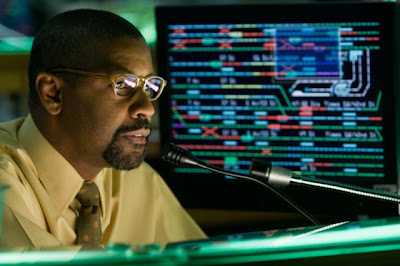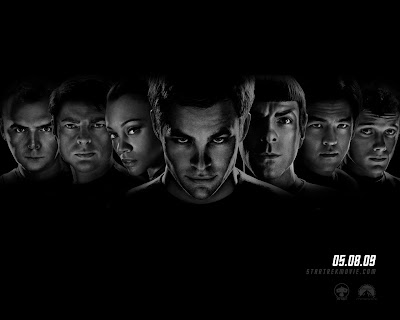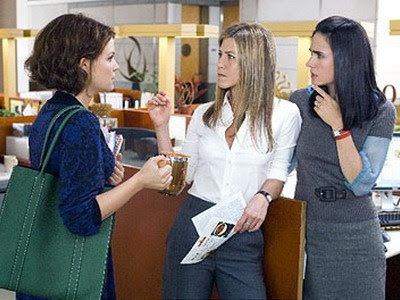
Saturday, August 29, 2009
Halloween II

Friday, June 26, 2009
Michael Jackson

Saturday, June 13, 2009
The Taking of Pelham 123

Sunday, May 10, 2009
Terminator Salvation/Star Trek


Sunday, May 03, 2009
Wolverine

Saturday, April 25, 2009
Obsessed

This is an over-the-top, crowd-pleasing movie that teases and taunts its way to the grand finale that everyone is blood-thirsty for -- that catfight between Beyonce Knowles (aka Sasha Fierce) and Ali Larter, who plays the femme fatal.
A much milder rip-off of Fatal Attraction, the film features Idris Elba as Derek, a happily married man (you would be happy too if you were married to the fineness that is Beyonce) with a new house, a successful career and a son named Kyle.
All is perfect until Larter's Lisa comes into his life, a cute blond who is temping at his agency. Somehow, she ends up being a permanent and very seductive presence in his life, tempting him with racy e-mails and saucy come-ons accompanied with sneaking a drug into his drink. Unlike Fatal Attraction, nothing happens between Derek and Lisa, despite Lisa's fervent attempts.
But that doesn't stop Lisa from creating some crazy fantasy in her head that Derek and she are destined to be together, if only Derek's wife, Sharon, wasn't in the way.
And that's when Beyonce shines. This ain't deep. Beyonce gives Sharon that around-the-way, don't mess with my man kind of attitude. That ready to take her earrings and serve some self-righteous beatdowns swagger that only Sasha Fierce can bring.
Too bad it takes a lot of shouting and not-too-subtle attempts by Lisa before the showdown comes in the last 15 minutes of the film.
Elba and Beyonce have some nice scenes together, and Larter does a good job of making Lisa the kind of sick bitch we like to see get her comeuppance at the end. Plus, the catfight is worth the wait. Trust me.
Predictable? Absolutely. Poor script? No doubt. Entertaining? Hell yes. And even with blood trickling down her chin, Beyonce is still gorgeous.
Sunday, April 19, 2009
State of Play

Thursday, March 26, 2009
I Love You, Man

Saturday, March 07, 2009
Watchmen

Sunday, February 22, 2009
Madea Goes To Jail

Saturday, February 07, 2009
He's Just Not That Into You

Saturday, January 17, 2009
Notorious

Notorious, the new biopic about rapper Christopher Wallace, manages to peel the complicated man from the bigger-than-life myth. He was Biggie Smalls, Frank White, the Notorious B.I.G., smooth as the silky sheets he bedded many ladies on, the consummate charmer who could get away with the line, "black and ugly as ever, however," the gangsta rapper whose clever wordplay and poignant story-telling abilities grabbed fans' attention and never let go.
He was all of that, but as the movie shows, he was more. Wallace, played by rapper-turned-actor Jamal Woolard in his first starring role, was also that nerdy Catholic school boy with a strict Jamaican mother (Angela Bassett who, unfortunately, plays her without the Jamaican accent ) who finds himself lured into the dangerous street life of drug hustling. Cash rules everything around Wallace's world, and he succumbs to the addiction of making fast cash, so much that he even deals drugs to a pregnant woman.
We follow him as he goes from negative to positive, avoiding a long jail bid only because his friend believes in him so much that he is willing to serve that bid for him. And we see him connect with Sean Combs (known as Puffy in those days and ably played by Derek Luke), the dance-crazy ambitious producer who founds Bad Boy Entertainment and makes Wallace a star.
We all know how this will end, with Wallace shot to death on March 9, 1997, from a still-unknown shooter on the streets of Los Angeles, six months after his former friend and greatest rival, Tupac Shakur is shot to death in Las Vegas.
Yet, for a little while, we reminisce on the heady days of hip-hop's glory in the mid-1990s, when "we won't stop" seemed like fulfilled prophecy, when thought went into lyrics, when beats banged, when pop collided with the grittiness of gangsta rap.
But this isn't a whitewash, or at least not much of a whitewash as we would expect from a movie produced by Voletta Wallace, Biggie's mother, and Sean Combs. As directed by George Tillman, Wallace is somewhat of a little boy trapped in a big man's body, not sure yet how to be a man.
He cheats on his wife, Faith Evans, and plays his girl-on-the-side, Lil Kim (who by the way is upset at the way she is portrayed in the film) with shuddering coldness. And he deals poorly with baby mama drama, neglecting his children as he pursues his dream of rap superstardom.
Not all is good with this movie. Tillman breezes through the East Coast-West Coast battle and the subsequent death of Shakur, who comes across as a paranoid nutjob, not the well-read son of a Black Panther who flitted between ignorance and intelligence. Shakur's enigmatic allure is never felt, as much as Anthony Mackie tries. He is a side note never fully realized.
Even more troubling is this notion that Wallace was ready to turn a new leaf in his music, a near-fatal car accident forcing him to deal with the responsibility his talent lay at his feet. The movie is filled with scenes of Wallace's best friend exhorting him to take better care of his daughter followed by a scene in which he tells his daughter to never let a man call her a bitch. And on the night of his death, we see him make calls to the women of his life, trying to make amends and become a better man.
It all comes across as a little off-putting, this redemption song, for in his CD, Life After Death, he still spun gangsta tales and misogynistic boasts of sexual conquest. So forgive me if I don't quite buy it.
The power of the movie lies in Woolard's performance, in his ability to embody the man behind the myth, behind all the smooth talk. He finds the scared kid underneath the facade. He finds the layers that reveal the complexities of a literally larger than life individual. He wasn't a saint and he wasn't a monster. He was somewhere in between, just like all of us, a born sinner, a black male misunderstood.
And for the most part, it is all good.
Sunday, January 04, 2009
Seven Pounds Revisited

Saturday, December 20, 2008
Seven Pounds

Sunday, November 23, 2008
Twilight

Saturday, November 15, 2008
Quantum of Solace

Sunday, November 02, 2008
Zach & Miri Make a Porno

Saturday, October 25, 2008
The Secret Life of Bees

Monday, October 13, 2008
Miracle at St. Anna

Sunday, October 05, 2008
Nick and Norah's Infinite Playlist
